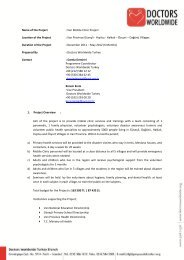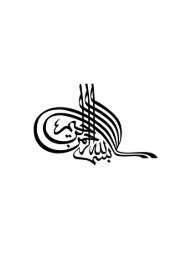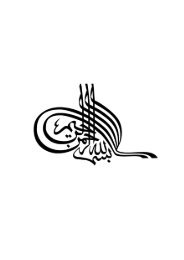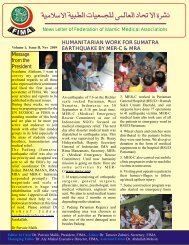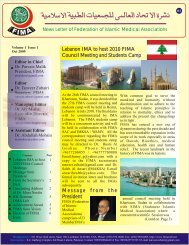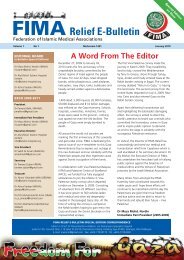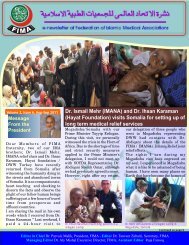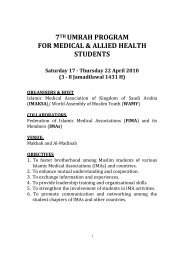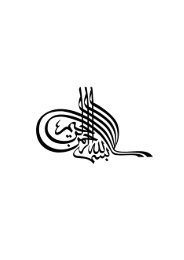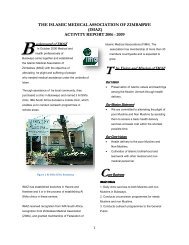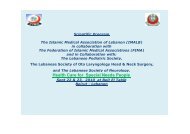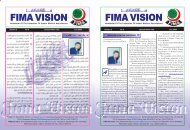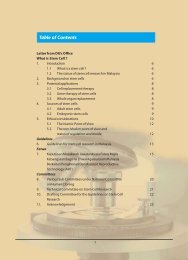FIMA Year Book 2009 - Federation of Islamic Medical Associations
FIMA Year Book 2009 - Federation of Islamic Medical Associations
FIMA Year Book 2009 - Federation of Islamic Medical Associations
Create successful ePaper yourself
Turn your PDF publications into a flip-book with our unique Google optimized e-Paper software.
Ethical Issuesnon-Muslim physicians within aninstitution based on <strong>Islamic</strong> teachingswill contribute directly to a moral andethical change in the national healthcare delivery system.The <strong>Islamic</strong> teachings related to theunderstanding and practice <strong>of</strong> medicinemust be an integral part <strong>of</strong> conceptsrather than patching these teachings tothe curriculum, and must be directed atsupplying conceptual tools that makethe scientific study <strong>of</strong> medicine and itsmethodology deeper, universal, andobjective. The dichotomy that existsin many Muslim institutions <strong>of</strong> higherlearning should be removed such thatthere are no religious sciences distinctfrom non-religious ones. The <strong>Islamic</strong>input should be fully integrated intothe medical curriculum and shouldpreferably be taught by the samepr<strong>of</strong>essors who teach other medicalsubjects. Moreover, our pr<strong>of</strong>essionalshave to be trained to internationalstandards such that they can workanywhere in the world.In Muslim countries, very little hasbeen done on postgraduate curriculaand training programs. Thoughacquiring knowledge with a continuouspace has been greatly emphasized andstressed in Islam, little has been donefor continuing medical educationand personal development <strong>of</strong> doctors.Our medical institutions must adopta regular system <strong>of</strong> training andeducation with special reference to ourloco- regional requirements withoutmarginalizing the internationalneeds and requirements. Training <strong>of</strong>Muslim doctors for specialization andsuperspecialization mainly dependsupon the Western institutions. Muslimcountries, inspite <strong>of</strong> having sometraining programs in their institutions,are lacking properly designedtraining programs with specialreferences <strong>of</strong> <strong>Islamic</strong> ethical values.Moreover, knowledge duplicationand consumption <strong>of</strong> techniques areso prevalent in our societies that weeven do not bother to look into thoseprograms which are designed in a set<strong>of</strong> reference for particular reasons, inparticular ethical framework and insecular environment. This ultimatelycreates contradictions and conflictsamong our trainees and we have beenneither able to prepare Muslim nornon Muslim specialists. Our doctorsneed to be trained with clarity <strong>of</strong> mind,sound faith and up-to-date expertise intheir respective fields. Our continuingmedical education programs, as arequirement <strong>of</strong> a faithful and correctdoctor, must also include continuousupgrading <strong>of</strong> knowledge <strong>of</strong> ethicalissues including ethics <strong>of</strong> human andanimal research in addition to newdevelopments in medicine. (24)Pedagogical methodology andthe learning process in medicalinstitutions:The teaching methodologies andpedagogical instruments in medicalschools must be designed in such afashion that these techniques shouldreflect <strong>Islamic</strong> ideology and <strong>Islamic</strong>way <strong>of</strong> life. Any uncertain ways and<strong>FIMA</strong> <strong>Year</strong><strong>Book</strong> <strong>2009</strong>90




